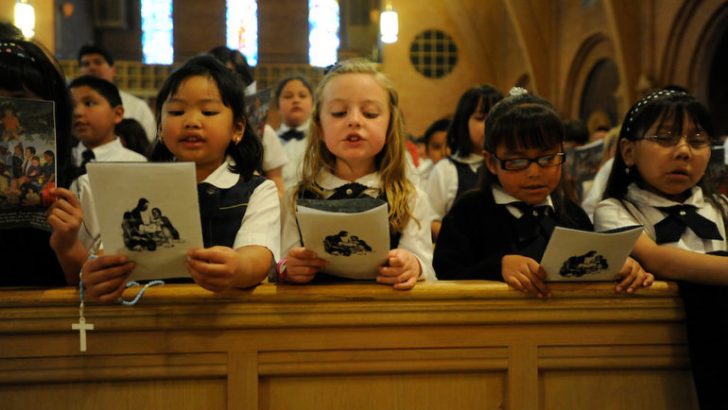The View
September is a month that means back to school for most families: new uniforms and bags are donned while the trees shed their leaves and the last of the summer sun wanes.
It is an exciting time, full of expectation that the newness of a fresh start brings. It is, for Catholic parents whose children are starting school for the first time, a new chapter in meeting their divine obligation to educate their children. The Catechism of the Catholic Church describes this awesome responsibility as the primary duty of parents towards their children.
In the words of the Second Vatican Council in its declaration on Christian Education, a true education aims at the formation of the human person in the pursuit of his ultimate end and of the good of the societies of which, as man, he is a member, and in whose obligations, as an adult, he will share. In other words, as parents and educators we are attempting to form the adult from the child, so that he or she will be able to go out into the world and pursue the task or vocation that God has planned for him or her, remembering that the ultimate end that each one of us should be pursuing is heaven.
But can what is being taught in Catholic schools truly be called a Catholic education? Because of the State’s involvement in our schools – usually in the form of paying teachers’ salaries – there are influences that are distinctly un-Catholic – and even anti-Catholic.
Effort
Over the last number of years, the State has been busily planning reforms in the area of religious teaching and relationships and sexuality education (RSE). If only they would put as much effort into literacy and numeracy, our children would be better off. Instead, the National Council for Curriculum and Assessment (NCCA), which is a statutory body that advises the Minister for Education, is intent on diluting any possible religious influence in schools, and intensifying emphasis on explicit sex education.
Meanwhile, the Provision of Objective Sex Education Bill, which the government has said it will not oppose, seeks to make it compulsory that children – including primary school children – be taught about different types of sexuality, different types of gender, methods of contraception and abortion.
The Bill proposes that schools and boards of management be allowed to uphold the ethos of the school in all areas except RSE. The report on RSE by the Oireachtas Joint Committee on Education and Skills published in January of this year makes similar proposals.
This approach to RSE is antithetical to Catholic teaching. For instance, those proposing the bill think that abortion should be taught to children as a right and a good, a freedom for women. As a Catholic, I see it as oppressive of women and a terrible injustice done to an innocent baby. These are irreconcilable positions. They represent totally different values and worldviews.
If people want to raise their children with the belief that human life has no intrinsic value, I am not going to force them to do otherwise. But note: it is the secularists who want to force religious people to be taught something that goes against their traditions, beliefs and conscience.
They want to impose their worldview on all children and their parents. So the question is: who’s the liberal now? Where’s the tolerance for dissent?
The identifying mark of a Catholic education is that it takes a certain moral outlook, based on the idea that it acknowledges God as creator who has revealed certain truths and His laws to us, and to whom reverence is due.
The world is content with setting right the surface of things”
Blessed John Henry Cardinal Newman, who is be canonised on October 13, expressed this purpose of Catholic education in his series of discourses given in Dublin in 1852, later published as The Idea of a University. He wrote of how the Church’s involvement in university education does not focus on intellectual pursuits for their own sake, but for the sake of religion, for the sake of the Church’s children and their moral and intellectual good, their usefulness in God’s plan.
We should be able to say the same of any Catholic school. Can we? Does God’s plan for every individual child’s life figure in the school day, in what is being taught and how? Are secondary school children encouraged to be ambitious and pursue worldly goals, not for their own sake, in Newman’s words, but rather to fulfil the task set to them by God? Is God’s law taught and respected in Catholic schools? And if not, how are they different from any other school? What is the point of a Catholic school that does not teach Catholic doctrine or put God at the centre of the school day?
Classrooms
Many, including some committed Catholics, are now of the view that it would be better for the Church to take religion out of the classroom and leave it to the parishes to catechise children. While I am all for more and better catechesis in parishes, I think that we cannot allow religion to leave the school and the classroom. To do so would be to fail our children miserably. Our faith is not something we put on or take off depending on where we are, but rather the very core of our being. And of course, to remove religion completely from schools merely clears the path for a so-called “neutral” education that is in truth opposed and hostile to our religion and its precepts.
As Cardinal Newman says, the world is content with setting right the surface of things; the Church aims at regenerating the very depths of the heart. A Catholic education then requires the education of the whole person, particularly the interior. For as Christ says, “what does it profit a man if he gain the whole world, but lose his soul?” And so a Catholic education speaks to the mind, body, heart and soul.
If we are trying to teach our children, not just to reach their potential in academic or other terms, but also to become good people with a love of God, should we not by lesson and example be telling them to make their relationship with God part of their every day?
Isn’t that what he deserves from our children, and what our children deserve from us?
The Irish Catholic will be hosting an Education Conference on October 24th 2019. Visit our website to purchase tickets. Early bird special ends September 30th 2019.


 Maria Steen
Maria Steen
